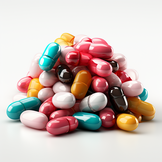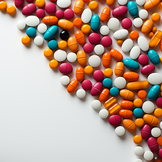Comparison of revatio and viagra for treating erectile dysfunction.
- Introduction to Revatio and Viagra
- The Active Ingredient: Sildenafil
- Effectiveness in Treating Erectile Dysfunction
- Factors to Consider When Choosing Between Revatio and Viagra
- Dosages and Strengths for Treating ED
- Mechanism of Action: Relaxing Smooth Muscle Cells and Increasing Blood Flow
- FDA Approval and Intended Uses
- Consulting a Healthcare Provider for Personalized Advice
- Comparison of Revatio and Viagra for Treating Erectile Dysfunction
- What is the #1 Erectile Dysfunction Pill?
- Does Revatio Work as Good as Viagra?
- What is the Difference in Dosage Between Revatio and Viagra?
- Which Medication is More Effective for Treating Pulmonary Arterial Hypertension?
- What is Better Than Viagra for Erectile Dysfunction?
- Can Revatio Be Used to Treat Erectile Dysfunction?
- What is the Strongest Tablet for Erectile Dysfunction?

Introduction to Revatio and Viagra
Revatio and Viagra are both brand-name medications, notable for their treatment in certain medical conditions. Viagra, most commonly known for its role in treating erectile dysfunction (ED), has become an everyday name. On the other hand, Revatio, while lesser-known, plays a vital role in managing pulmonary arterial hypertension (PAH).
The Active Ingredient: Sildenafil
Sildenafil is the active ingredient in both Revatio and Viagra. While they are two separate branded drugs, their shared active ingredient means they function in similar ways and are used to treat conditions that involve the cardiovascular system and blood flow.
Effectiveness in Treating Erectile Dysfunction
When it comes to treating ED, sildenafil, as used in both Viagra and Revatio, has been found to be very effective. Viagra, as one of the most well-known drugs to treat ED, has earned its reputation for a reason. It has proven its ability to assist men in achieving and maintaining an erection for sexual activity.
As for Revatio, while it is primarily intended for treating PAH, off-label usage for ED has shown effectiveness due to the shared active ingredient, sildenafil.
Factors to Consider When Choosing Between Revatio and Viagra
Deciding between Revatio and Viagra for the treatment of ED involves several factors. This includes consideration of the different dosage strengths, cost, potential side effects, and individual medical history. Also, Viagra is usually prescribed specifically for erectile dysfunction, while Revatio is typically intended for treating PAH.
Dosages and Strengths for Treating ED
While both medications contain sildenafil, they are available in different strengths. Viagra is typically available in 25 mg, 50 mg, and 100 mg tablets. On the other hand, Revatio is usually offered in a 20 mg tablet for treating PAH.
For treating erectile dysfunction, the typical starting dose of Viagra is 50 mg, taken approximately one hour before sexual activity. However, the dose may be adjusted based on efficacy and tolerability. Revatio is typically dosed three times daily for PAH, but for off-label use in treating ED, healthcare providers may adjust the dosage accordingly.
Mechanism of Action: Relaxing Smooth Muscle Cells and Increasing Blood Flow
Sildenafil works by inhibiting an enzyme called phosphodiesterase type 5 (PDE5). This action leads to the relaxation of smooth muscle cells, particularly those lining the blood vessels of the penis, and allows increased blood flow, which is essential for an erection.
FDA Approval and Intended Uses
Viagra was approved by the FDA specifically for the treatment of ED in 1998. Meanwhile, Revatio was approved for treating PAH in 2005. The use of Revatio for ED, while not its intended use, has been observed in some cases due to its mechanism of action and the common active ingredient with Viagra.
Consulting a Healthcare Provider for Personalized Advice
Due to the complexities and individual factors involved in choosing a treatment, it is essential to consult a healthcare provider. They can provide personalized advice based on your specific medical history, current health status, and other medications you may be taking.
Now, addressing some common related questions:
Comparison of Revatio and Viagra for Treating Erectile Dysfunction
While both Revatio and Viagra contain sildenafil and can effectively treat ED, they differ in terms of their intended use, dosing, and cost. Viagra is specifically intended and FDA-approved for ED, while Revatio is primarily for PAH, with ED treatment being an off-label use.
What is the #1 Erectile Dysfunction Pill?
Viagra, containing sildenafil, is one of the most well-known and commonly prescribed pills for ED.
Does Revatio Work as Good as Viagra?
Given they share the same active ingredient, Revatio can also be effective in treating ED. However, this is considered off-label use, and it should be taken under the guidance of a healthcare provider.
What is the Difference in Dosage Between Revatio and Viagra?
Viagra is usually prescribed in dosages of 25 mg, 50 mg, or 100 mg for ED, while Revatio typically comes in a 20 mg tablet for PAH. For ED, dosage adjustments may be needed if using Revatio.
Which Medication is More Effective for Treating Pulmonary Arterial Hypertension?
Revatio is specifically designed and approved for treating PAH, making it the more appropriate medication for this condition.
What is Better Than Viagra for Erectile Dysfunction?
While Viagra is very effective, there are other medications, such as Cialis (tadalafil) and Levitra (vardenafil), which some men may find work better for them. It ultimately depends on individual responses and side effects.
Can Revatio Be Used to Treat Erectile Dysfunction?
Yes, while not its primary indication, Revatio can be used off-label to treat ED due to the shared active ingredient, sildenafil, with Viagra.
What is the Strongest Tablet for Erectile Dysfunction?
The "strongest" tablet for ED will depend on individual response and tolerability.
Among the options are high-dose sildenafil (Viagra), tadalafil (Cialis), and vardenafil (Levitra).
However, higher strength does not necessarily mean more effectiveness, and it may increase the risk of side effects. Always consult a healthcare provider for personalized advice.



